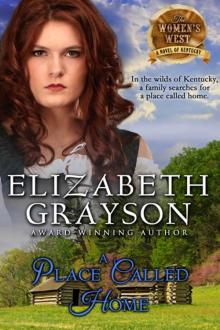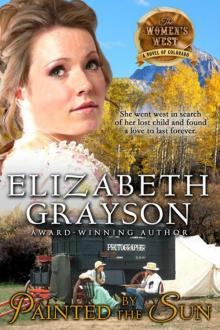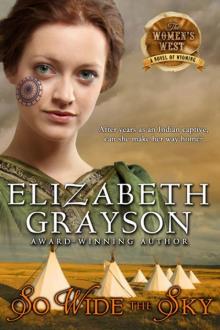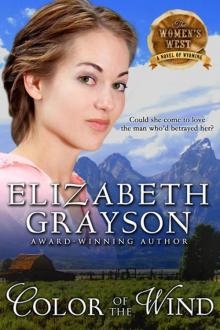- Home
- Elizabeth Grayson
A Place Called Home
A Place Called Home Read online
A Place Called Home
The Women's West Series
Book Three
by
Elizabeth Grayson
Award-winning Author
A PLACE CALLED HOME
Reviews & Accolades
"...stirs the reader's emotions. A story of a remarkable women's desire to forge her own destiny and follow her heart. A novel to remember."
~Kathe Robin Romantic Times
"...keeps you reading to the exclusion of all else. This is probably the best book on the period I have ever read."
~Rendezvous
"This lady can spin a tale of historical magic. She does that and more in this beautiful story of Livi Talbot and her long road to happiness."
~The Readers' Voice
Published by ePublishing Works!
www.epublishingworks.com
ISBN: 978-1-61417-719-7
By payment of required fees, you have been granted the non-exclusive, non-transferable right to access and read the text of this eBook. No part of this text may be reproduced, transmitted, downloaded, decompiled, reverse engineered, or stored in or introduced into any information storage and retrieval system, in any form or by any means, whether electronic or mechanical, now known or hereinafter invented without the express written permission of copyright owner.
Please Note
This is a work of fiction. Names, characters, places, and incidents either are the product of the author's imagination or are used fictitiously, and any resemblance to actual persons, living or dead, business establishments, events or locales is entirely coincidental.
The reverse engineering, uploading, and/or distributing of this eBook via the internet or via any other means without the permission of the copyright owner is illegal and punishable by law. Please purchase only authorized electronic editions, and do not participate in or encourage electronic piracy of copyrighted materials. Your support of the author's rights is appreciated.
Copyright © 2014 by Elizabeth Grayson. All rights reserved under International and Pan-American Copyright Conventions.
Cover by Kim Killion www.thekilliongroupinc.com
eBook design by eBook Prep www.ebookprep.com
Dedication
To Eileen Dreyer and the conquest of Everest
Acknowledgements
So many people come to the aid of an author during the writing process that I find myself wanting to thank everyone—including the Pizza Hut delivery boy. Certain individuals, however, do stand out.
In the area of research, I would like to both thank and bless Eleanor Alexander, who served as my research assistant and sounding board for the sections of the manuscript concerning Native American culture. In sharing her time, her books, her enthusiasm, and her expertise, she gave me a wonderful basis for the sections of the manuscript that deal with the Creek way of life.
Once again Charles Brown at the Mercantile Library Association of St. Louis has proved himself astonishing adept in providing me with a wealth of information on Kentucky and the Wilderness Road from Mercantile's seemingly inexhaustible American history collection.
I would also like to acknowledge John Villeneuve, who has long been my source on period weaponry and hunting. His ability to tell me more than I ask and his willingness to play "what if" make him a resource I truly value.
My friend and curator extraordinaire Joyce Schiller of the Rockwell Center for American Visual Studies at the Norman Rockwell Museum has once again come through with several delicious tidbits to give veracity to the world my characters inhabit. Her enthusiastic support for what I do is a gift I appreciate from the bottom of my heart.
I would also like to give a big hug to my husband, Tom, for his ongoing help in researching my books. In this case, that took the form of negotiating the still fairly rustic highways along the route of the Wilderness Road. That he did this from period maps and in a driving rainstorm, with a companion who was busy seeing pack trains and pioneers, attests to his qualifications as both a pathfinder and my hero.
On the professional level, I would like to thank both Meg Ruley and Ellen Edwards for encouraging me to spread my wings and write this book, even when it meant trying things I'd never done before.
No set of acknowledgments would be complete without a mention of my writer friends who have read, critiqued, and gone out of their way to say the right things at the right moments. My wonderful colleagues are Eileen Dreyer, Linda Madl, Ella March Chase, and Elizabeth Stuart. And I would like to say a special thank you to Karen Harper for recommending and sharing.
And last but not least, I want to express my appreciation to my "Mom Consultants"—the ladies who shared their expertise with one of the uninitiated—Kim Ostrom and Eileen Dreyer, Linda Madl and Libby Beach, Debbie Dirckx-Norris and Johann Stallings. And especially my sister-in-law, Renee Witmer, who went above and beyond the call of duty by getting pregnant so I could take notes.
Thank you all!
Prologue
On the Wilderness Road
March 1782
David Talbot awoke to a feral, dusky scent drifting in the dank night air. To the chill of a sinister presence tickling along his skin. To a knot of anticipation snarled beneath his ribs. The stealthy pad of footsteps passing close outside the tent where he and his family slept brought both dread and confirmation. There was someone in their camp.
Clearly, his wife had sensed it, too. "Someone's out there," she breathed, reaching across to manacle icy fingers around David's wrist.
"It'll be all right, Livi," he whispered back.
Coiling out of his bedroll, David nudged open the tent flap with the barrel of his pistol and peered outside. By the light of the waning moon, he could make out two figures rifling through their packs on the far side of the glowing campfire. Talbot could see the sway of the men's breechclouts as they moved, the feathers in their hair.
Indians bent on thievery, David thought.
Not something to fear on this side of the mountains.
He turned to the woman beside him. Even in the darkness he fancied he could see the terror blazing in her eyes, turning them green and bright as bottle glass. They'd been on the trail less than a week, and already Livi was being forced to confront her fear of the wilds, her fear of the Indians. David longed to take her in his arms and soothe her with the stroke of his hands.
"It's going to be all right," he whispered. "It's only a couple braves bent on mischief."
Knowing full well that his actions belied the comforting words, David cocked his pistol and pushed the butt of it into Livi's palm.
"Just don't shoot me by mistake," he murmured, checking the prime on his long rifle. "Stay here in the tent. Don't come out unless I shout for you."
He glanced back at the two children still nestled in their bedrolls. "And don't let Tad leave, either. Now that he's twelve, he's got some damn peculiar notions about being grown up."
He could sense Livi's panic spiraling, smell the fear on her skin. He would have sold his soul to spare her this.
He leaned across and kissed her hard. "Just leave this to me."
Turning, David bolted from the tent.
"You there!" he bellowed coming to his full, intimidating height. "What are you doing with those packs?"
The two Indians stiffened and jerked around. Shawnee, Talbot realized. What the hell were Shawnee doing this far east?
He'd barely finished the thought when one of the pack-horses snorted off to his left. A glance in that direction revealed two Indians clinging to the packhorses' leads and two more beyond them at the edge of the woods. In the faint light of the moon, he could see their faces were painted black and vermillion, the colors of war.
Chills prickled up Talbot's back. No
raiding party had ventured this far east in a decade.
One of the men came out of the trees. "Where is it?" he demanded in Shawnee.
"Where is what?" David answered in the same language.
"What have you done with it?"
David stepped back a pace and raised his gun. "We don't have whatever it is you want."
As he spoke, one of the men who had gone back to poking through the packs gave a grunt of acknowledgment.
"Here," he exclaimed. "It's here."
The brave came to his feet holding a deerskin medicine bag.
David's gut tightened. He leveled his gun. "Put that down." The brave clutching the medicine bag glared defiance.
David edged away from the tent, skirting the campfire. When he was close enough, he reached for the bag. "Give it to me!" he said.
With his left hand the brave extended the medicine bag toward David. With his right he jerked a knife from the sheath at his waist. The blade flashed in the half-light as he lunged.
Pain burned through the flesh of David's upper arm. He dodged away and fired.
The ball caught the brave full in the chest. He looked down, his eyes widening, glazing. He staggered backward and fell.
* * *
As the sound of the shot boomed deep into the hills, the doeskin bag spun from the Indian's grasp, skittering across the ground in a swirl of fringe.
From inside the tent David heard Livi and the children stirring, sensed their confusion and alarm. He shifted to his left, preparing to defend them with his empty rifle.
A whoop of fury split the night and the warrior at the edge of the woods pelted down the rise. As he ran, he raised the war club in his left hand.
Recognition sizzled along Talbot's nerves. He knew who this was and sensed what was about to happen.
"I'm sorry, Livi," David mumbled. "Oh, God, I'm sorry."
With ferocity scored in every movement, the warrior swung his war club. It scribed a long, wide arc, a slash of pure intensity and hatred whistling through the night.
Talbot raised his empty long rifle to ward off the blow.
The clash of the weapons coming together jarred up David's arms. The force of it bashed his rifle aside.
The man set his feet. He swung his war club again.
Talbot fumbled to defend himself, but the blow came swifter, harder.
It battered the rifle from David's hands. It smashed into the side of David's skull.
The world flared hot and bright before his eyes. Pain ripped apart sight and sense and consciousness. The last thing David Talbot heard was the shattering terror of Livi's scream.
Chapter 1
It was raining in the mountains, a chill, persistent drizzle that wrapped the world in a haze of gray. Clouds shrouded the towering peaks and blurred the jagged lines of ridges that faded into the distance. It was raining in the hills that huddled at the knees of the mountains, wafting into the bristle of barren trees, spattering into the mat of last year's leaves strewn on the forest floor. It was drizzling down to feed the streams that flowed through the valley at the mountains' heart.
Through that lush valley a road funneled down from the north. It began in the wild green hills of Western Pennsylvania, a track that charted the turns and hummocks on the valley floor and mounted the rising hills at its lower end. It pushed south and west to challenge the heights at the Cumberland Gap and spill into the Promised Land on the opposite side.
During these last unsettled years when a nation was struggling to be born, the road had been worn deep into the rich Virginia earth. Now, with the coming of peace, it would be trod by thousands seeking a better life. Many who passed this way would fulfill their dreams. Many others would bury them.
Today, on a rise at the side of the road, a woman and two children stood over a raw, fresh grave. Their story was not new to the high, encircling hills. Those seeking a better future would embrace hope and endure loss again and again. Only the faces of the mourners changed.
This woman stood tall and spare, a damp red braid drooping down her back. A shabby green cloak swaddled her from head to toe, but beneath the brim of the chipped-straw hat she had affected to keep off the rain, her face shone with a rare, deep beauty that not even her sorrow could weather away.
A girl-child nestled close against her mother's side, a fair and tender girl. The kind so easily lost on a trek as dangerous as this. A boy edging toward manhood held himself a little way apart. Lacking the confidence to comfort or the maturity to share his grief, he shuttered his feelings close inside.
In a voice thick and grainy from crying, the woman finished reading from the Bible she cradled in trembling, mud-stained hands. "...that whosoever believeth in Him shall not perish from the earth, but have everlasting life."
Soft, murky silence had long since closed around her words when she finally lifted her eyes from the mound of red Virginia dirt, from the two peeled sticks lashed inexpertly together to form a cross.
You deserve better than this, David. Better than a shallow grave at the side of the road. Better than we three mourners to mark your passing. Better than I have been able to give you.
She shivered in the wind that swept out of the hills, breathed the earthy musk of woodlands awash with rain, watched this strange and hostile world through tear-wet eyes. And wondered where she should go from here.
After a time, Tad Talbot laid a hand on his mother's arm. "Shall I strike the tent, Ma?" he asked. "Shall I saddle the horses?"
His questions rolled over Livi with all the force of a breaking wave, battering her with new responsibilities. Her chest tightened as if she were battling for breath. Her ears rang with the roar of mounting panic. She clung to her Bible as if to an anchor, to keep from being swept away.
Using a soft, frayed ribbon to mark the page, she closed the book and steeled herself to face her son. He stood before her with the wide, fresh face of a twelve-year-old and the eyes of an infinitely older man.
"We should be getting packed up, shouldn't we?" Tad prodded her. "Pa would want us to go on to Kentucky."
"Kentucky." Livi spit out the word as if it were ashes in her mouth. That Tad should speak it standing over his father's grave smacked of blasphemy.
Still, she knew her son was right. David would expect her to carry on. He would expect her to pack up their belongings—in spite of his death, in spite of the Indians—and claim the acres beyond the mountains. He would expect her to make a home for the three of them on his land. But how in God's name could she do that when she loathed the very thought of Kentucky, when every mile between here and there teemed with all-too-imaginable terrors?
"Mama?" Her daughter's voice was barely louder than the patter of rain through the trees. "Mama?"
Livi looked down to where her four-year-old snuggled close, down at her rumpled rose-gold curls, down into her whiskey-brown eyes. They were eyes that would ever mark the girl as David's child.
"What is it, Sugar?" she asked, eager to put off the decision she did not know how to make.
"When we go on to Kentucky, is Papa coming with us?"
Cissy's question dropped the weight of an anvil on Livi's chest.
In the horrid, garbled hours between midnight and dawn, when David had lain breathing but beyond her help, Livi had tried to explain to her children what dying meant. Tad was older, he'd understood. But Cissy...
"Don't be a goose, Cissy," Tad snapped. "Of course Pa isn't—"
Abruptly Livi turned on her son. "Let me answer her," she admonished, having no idea if she could.
Livi went down on her knees beside her daughter, took her small, soft face between her palms. The confusion in Cissy's eyes swelled the ache around Livi's heart. How could she explain David's death to Cissy when she didn't understand it herself? What could she possibly say that would make losing the father she adored easier for his little girl?
"We talked about this last night," Livi began in a voice thick with suppressed tears. "I told you Papa died, that he went aw
ay."
The girl's eyebrows skewed together. "But Papa hasn't gone away. He's right under there. We wrapped him in the daisy quilt to keep the dirt off his face. We put him to sleep in the ground just like you said."
At Cissy's words, the reserves of patience and compassion Livi had been clinging to crumbled beneath her fingertips like tinderbox char. She didn't have any soft, sweet words to soothe her daughter. She didn't know how to fill the void David's death was leaving in all their lives. If it weren't for the trust in Cissy's eyes, Livi would have succumbed to hopelessness and walked away.
Instead she drew a shaky breath and tried to explain death to her daughter another way.
"Do you remember when Tad's dog, Rusty, got so old he could hardly get around? How he lay down by the fire one night and never woke up? Well, something like that happened to your father."
"Papa's not old like Rusty was."
"No, but sometimes younger people die. There's nothing we can do. When someone's dead we bury them."
"Like we buried Rusty."
The roar of fear and impatience inside Livi dropped to a hum. She was breathing a little easier. "That's right. We buried your papa's body, and his spirit has gone away to heaven. He'll stay there with God forever."
The child's face stiffened. "No, he's my papa. He loves me. He'll come back."
Livi wanted to believe that herself. Knew that, in spite of his silence, Tad wanted to believe it, too.
"Cissy, no," she insisted gently. "Heaven is so glorious and wonderful that people never come back."
"Papa came back from Kentucky, and he liked it there."
Livi fought down the burn of frustration. Death wasn't something open to debate. It was final, irreversible.
"I wish it were different, Sugar," Livi finally managed to say, "but going away forever is what dying means."
"No!" Cissy shook her head. "No! Papa will come back! He will. He will!"
Her daughter's cry swelled the tide of unworthiness and desolation rising in Livi's chest. In digging David's grave, wrestling his broken body into the ground and lifting shovel after shovel of dirt to cover it, she'd used up every scrap of her strength. She had no reserves to draw on, no energy to think or act or comfort. No brave things left to say.

 A Place Called Home
A Place Called Home Painted by the Sun
Painted by the Sun So Wide the Sky
So Wide the Sky Color of the Wind
Color of the Wind